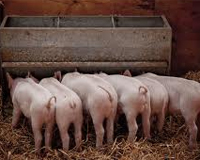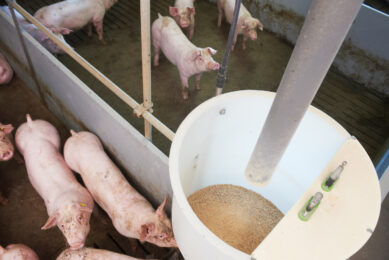Aarhus Uni: 100% organic diet for organic pigs

In future the feed for organic pigs and poultry will be 100 percent organic and it will be quite a challenge to meet the demand for, particularly, protein-rich feeds. You may think it strange that organic pork chops, eggs and poultry are not already produced from diets that are 100 percent organic.
You may think it strange that organic pork chops, eggs and poultry are not already produced from diets that are 100 percent organic. The difficulty has been to get hold of sufficient organic feeds to satisfy the demand – particularly for a source rich in protein. This will hopefully now become a thing of the past with the help of research at Aarhus University.
In a new research project, scientists from Aarhus University and from universities in Switzerland, Finland, Germany and the Netherlands, among others, will develop organic feeding strategies for the European pig and poultry market based solely on organic products. The 100 percent organic feeding systems that the project will be developing aim to satisfy not only animal nutritional requirements at the different stages of growth and production, but also health, welfare and environmental aspects. The scientists will also be concentrating on locally produced feeds.
The plan is to systematically map and assess individual feeds and feeding systems for pigs and poultry. Scientists will look at the nutritional value of the ingredients of the selected feeds and how accessible they are on the market. They will evaluate different types of roughage and compound feeds and will also assess the value of foraging.
Protein, roughage and foraging
Traditional feeds such as cereal and grass are not the only feeds sources studied. Who says that the protein source must be soybean imported from the other side of the planet? Europe has its own potential for growing protein-rich products, and combinations of, for example, varieties of lupine, naked oat, mussel meal, insect grubs, wild pea and sainfoin may be sufficient to meet the protein requirements of organic pigs and poultry in Europe.
Pigs and poultry are not normally the largest consumers of roughage, but roughage has a certain beneficial effect on animal digestion. A large intake of roughage, for example, helps to maintain a healthy gut flora and good digestive function. The supplementation with roughage for pigs can encourage them to increase their foraging, which makes them more active and reduces possible aggressive behaviour.
A diet including plants is known to provide animals with extra minerals and vitamins, but there are many gaps in our knowledge of the value of foraging for pigs and poultry. Both pigs and hens root around in the soil and in that way not only consume plant material, but also insects, larvae and other protein-rich sources. The scientists will investigate how much protein the foraging can contribute in different biotopes, such as deciduous forests, coniferous forests, windbreaks and in different breeds of pigs and poultry.
The project is a collaboration with Research Institute of Organic Agriculture in Switzerland, Agrofood Research in Finland, Johann Heinrich von Thünen Institute and University of Applied Sciences Weihenstephan-Triesdorf in Germany, Wageningen UR and the Louis Bolk Institute in the Netherlands, Organic Research Centre and Food Animal Initiative in England, BOKU-University of Natural Resources and Life Sciences in Austria, Institut Technique de l’Agriculture Biologique in France, Swedish University of Agricultural Sciences in Sweden and the Lithuanian Institute of Agrarian Economics in Lithuania. The project has been funded by the Green Development and Demonstration Programme of the Ministry of Food, Agriculture Fisheries.
Further information: Senior scientist John Hermansen, Department of Agroecology, email: john.hermansen@agrsci.dk, telephone: +45 8715 8017, mobile: +45 4080 1487
(By Janne Hansen)
Source: Aarhus University











